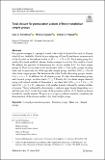Total closure for permutation actions of finite nonabelian simple groups
Date
02/03/2023Metadata
Show full item recordAbstract
For a positive integer k, a group G is said to be totally k-closed if for each set Ω upon which G acts faithfully, G is the largest subgroup of Sym(Ω) that leaves invariant each of the G-orbits in the induced action on Ω ×···×Ω = Ωk. Each finite group G is totally |G|-closed, and k(G) denotes the least integer k such that G is totally k-closed. We address the question of determining the closure number k(G) for finite simple groups G. Prior to our work it was known that k(G) = 2 for cyclic groups of prime order and for precisely six of the sporadic simple groups, and that k(G) ≥ 3 for all other finite simple groups. We determine the value for the alternating groups, namely k(An) = n − 1. In addition, for all simple groups G, other than alternating groups and classical groups, we show that k(G) ≤ 7. Finally, if G is a finite simple classical group with natural module of dimension n, we show that k(G) ≤ n + 2 if n ≥ 14, and k(G) ≤ ⌊n/3 + 12⌋ otherwise, with smaller bounds achieved by certain families of groups. This is achieved by determining a uniform upper bound (depending on n and the type of G) on the base sizes of the primitive actions of G, based on known bounds for specific actions. We pose several open problems aimed at completing the determination of the closure numbers for finite simple groups.
Citation
Freedman , S D , Giudici , M & Praeger , C E 2023 , ' Total closure for permutation actions of finite nonabelian simple groups ' , Monatshefte für Mathematik . https://doi.org/10.1007/s00605-023-01822-5
Publication
Monatshefte für Mathematik
Status
Peer reviewed
ISSN
0026-9255Type
Journal article
Description
Funding: St Leonard’s International Doctoral Fees Scholarship (SF); Australian Research Council (DP190101024, DP190100450).Collections
Items in the St Andrews Research Repository are protected by copyright, with all rights reserved, unless otherwise indicated.

